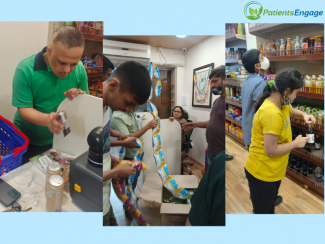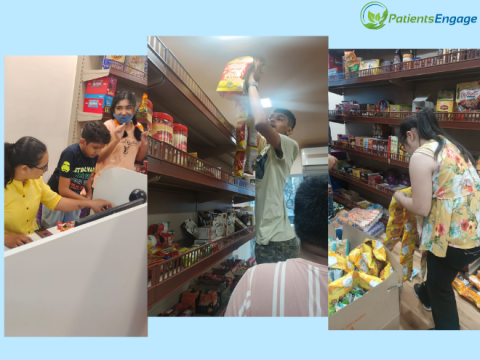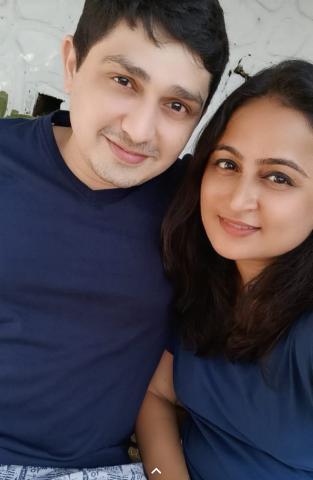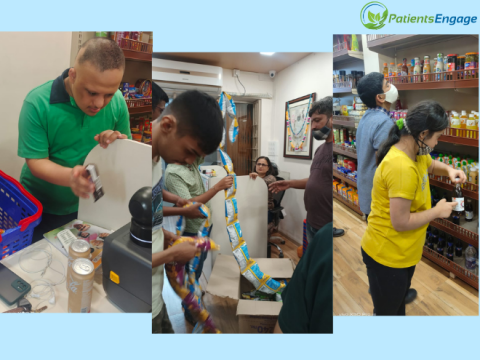
Dr Mihir Parekh, child psychologist and special educator, has recently opened Urja Mart, a supermarket handled by youngsters with Down’s syndrome and on the Autism spectrum. Here, he talks about how the initiative will help them gain real world experience and employability skills.
Dr Parekh, you have recently opened a supermarket, Urja Mart, managed by youngsters with special needs. Could you tell us a little about your unique initiative?
Urja Mart is a training mart for children with special needs. The main attraction of this initiative is children come in contact with live customers. They learn to interact with them, manage their emotions and, most importantly, feel valued that they are also an important part of the society. They learn to identify the products, know its manufacturing and expiry.
You are a child psychologist and special educator with a doctorate in psychology and diploma in special education. Is Urja Mart an extension and outgrowth of your work?
Yes, since my forte is children with special needs and their parents predominantly, I feel this initiative keeps them engaged and takes care of their mental health. Parents too feel happy and can anticipate positive outcomes and improvement in their kids. So apart from a counselling centre and special school, I feel such initiatives helps children with special needs grow. It also helps me deepen my perspective and understanding in my field.
Special Needs is an umbrella term for a wide array of diagnoses. How many special needs children are working at Urja Mart and what is their profile?
There are about 15 plus individuals getting trained at Umart and in a project called ‘Utsaah’. They are on the spectrum of intellectual disability and with various conditions like Down Syndrome and Autism. The total number of employees is 3 and kids are 15.

What is their age group and how did you identify them to join Urja Mart?
The age group for youngsters managing the mart is 16-20 years. We identify them through an interaction with the parent and the individual. Some are youngsters from our special school whom we observe throughout the year and in various events and then take a call to talk to their parents about training them. We are not equipped to handle individuals who have sensory difficulties, classical autism and behavioural difficulties.
Do they receive any stipend?
No, they do not get paid. It is a small Mart and an extension of our Remedial Centre. It has been set up primarily to give children some work experience and provide them an opportunity to face the world.
What training did the children go through to master the demands and complexities of a supermarket?
Firstly, they need to learn to stand for an hour or more. They need to greet customers when they arrive in the mart, handover the basket, talk about the products. They are also taught little more complex tasks like scanning and billing. In the absence of the customer, they are taught to identify the product, know about the product, stock them, stack and arrange them and clean them everyday.
Does Urja Mart stock the full range of supermarket products or is it restricted only to child friendly merchandises?
At this juncture the stock we have is mostly fast-moving consumer goods (FMCG) such as packaged foods, beverages and toiletries. After August, the youngsters will also display handicrafts made by them in the training process.
Urja Mart is a physical extension of the Urja Counselling and Remedial Centre. It is 200 sqft and the training centre is 1000 sqft. It is to give a real-life experience and environment to the children.
How many hours do the youngsters have to be in the Mart? And what facilities have been provided to build a conducive, comfortable environment for them?
Youngsters are in the mart for training from 1 - 5 pm. The mart is air-conditioned, they are given comfortable stools to sit in absence of the customer. The have tea, coffee or milk in the evening.
Are some of the aisles colour coded to make it easier for recognition? Or are there picture maps?
Not really, the racks and the sections are labelled. Since the mart is small and they visit regularly , stock it and arrange it themselves, therefore they have started to remember the sections and the products in a weeks’ time. (Urja Mart opened on March 20, 2022)
You and your wife, Pooja Parekh, have been working with children with special needs since 2008. It is commendable that Urja Mart is helping empower these students to maximise their potential. What has been the response of children to be working at a supermarket?
Children are super angels. They are extremely enthusiastic and on the go. The moment they see one customer, all of them are super excited to attend to that customer.

What has been the feedback of parents?
The feel happy, hopeful about this project as post pandemic their kids have got a chance to study and train themselves in this venture. They are happy that their kids are facing a real world and are learning real lessons of life in a simulated environment.
What are some of the challenges you faced while setting up and overseeing Urja Mart with special needs children?
It was difficult to find a place close to my school. Setting up a mart was also tedious. Some people have raised doubts and questions, ‘How can you get kids to work’. We had to make clear that Urja Mart is a training centre and not a place of employment. It was and is difficult to say ‘no’ to individuals with special needs who come and request to display their products.
Could you us how diversity and inclusion could be promoted in other ways at the workforce?
I personally feel that parents should sensitise their kids by making them interact with diverse individuals. This activity and engagement will make the kids practice inclusion not only in school but also at work place. They would think differently to make devices, furniture, equipment friendly to individual with special needs. In all the fields when individual with diverse needs are employed then in real sense inclusion will exist.
Namrata Jain, mother of Prisha
Prisha is 16, on the autism spectrum, and is working at Urja Mart.
Prisha has undergone a change since she joined Urja Mart. Even though she has been there only for a short duration, I can sense a development in her behaviour. She has become confident and socially lot more comfortable. Earlier, she would fumble and hesitate to talk before strangers and unfamiliar people. Now she has started interacting and speaking with a lot of different people. She has also become conscious of terms like MRP, expiry dates, etc. Now even at home she is looking at sauce and shampoo bottles for use-before dates. Once when I went to pick her up after her work timing was over, she refused to come home and wanted to be there even for the next shift too. She loves all affection and warmth people shower on her and her friends.

(Dr. Mihir Parekh, along with his wife, Pooja Parekh, a school counsellor and remedial educator, runs a centre for children with special needs called Urja counselling and remedial centre. Urja Mart opened on March 20, 2022 and is located at Mahavir Nagar, Kandivali West, Mumbai)






